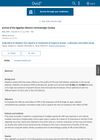 1 citations,
August 2023 in “Acta dermato-venereologica”
1 citations,
August 2023 in “Acta dermato-venereologica” Corticosteroids are the most common treatment for alopecia areata, but many patients need better options.
 1 citations,
May 2017 in “InTech eBooks”
1 citations,
May 2017 in “InTech eBooks” The document concludes that alopecia areata is an unpredictable autoimmune hair loss condition with no cure, but various treatments exist that require personalized approaches.
 April 2024 in “Dermatology and therapy”
April 2024 in “Dermatology and therapy” There are significant gaps and inconsistencies in diagnosing and treating alopecia areata in Greece and Italy.
 42 citations,
October 2012 in “Dermatologic Clinics”
42 citations,
October 2012 in “Dermatologic Clinics” Trichoscopy is a useful tool for diagnosing different hair and scalp diseases without surgery.
 3 citations,
October 2022 in “Frontiers in Surgery”
3 citations,
October 2022 in “Frontiers in Surgery” Proteomics combined with other technologies can lead to a better understanding of skin diseases.
 2 citations,
May 2022 in “JAAD Case Reports”
2 citations,
May 2022 in “JAAD Case Reports” A woman lost all her hair after mild COVID-19, but it started to regrow after treatment with a specific medication.
1 citations,
January 2019 in “Indian journal of paediatric dermatology” Kids with alopecia areata had lower vitamin D levels than healthy kids.
 May 2024 in “Journal of cosmetic dermatology”
May 2024 in “Journal of cosmetic dermatology” Tofacitinib is an effective and safe treatment for alopecia areata.
 January 2024 in “Skin appendage disorders”
January 2024 in “Skin appendage disorders” Using growth factors and microneedling shows promise for hair regrowth in Alopecia Areata, but more research is needed.
 2 citations,
July 2018 in “Elsevier eBooks”
2 citations,
July 2018 in “Elsevier eBooks” Trichoscopy is a useful tool for diagnosing and managing hair and scalp conditions, often better than traditional methods.
 September 2022 in “Journal of Investigative Dermatology”
September 2022 in “Journal of Investigative Dermatology” Patient-reported outcomes better reflect the quality of life impact of alopecia areata than traditional severity scores.
2 citations,
February 2023 in “Actas Dermo-Sifiliográficas” Baricitinib effectively improved both atopic dermatitis and alopecia areata symptoms in a patient.
 31 citations,
October 2013 in “Psychosomatics”
31 citations,
October 2013 in “Psychosomatics” Psychotropic medications can cause skin reactions, including severe conditions like SJS and TEN, and it's important for psychiatrists to recognize and manage these side effects.
October 2019 in “Our Dermatology Online” Androgenetic alopecia significantly lowers self-esteem and affects social interactions.
 10 citations,
January 2023 in “Journal of the European Academy of Dermatology and Venereology”
10 citations,
January 2023 in “Journal of the European Academy of Dermatology and Venereology” Alopecia areata greatly affects people's life quality, mental health, and work life.
 3 citations,
May 2018 in “Journal of the Egyptian Womenʼs Dermatologic Society”
3 citations,
May 2018 in “Journal of the Egyptian Womenʼs Dermatologic Society” Platelet-Rich Plasma treatment helps hair regrowth in people with mild Alopecia Areata, improving their quality of life with minimal side effects.
 November 2022 in “IntechOpen eBooks”
November 2022 in “IntechOpen eBooks” Hair loss can significantly impact a person's mental health, causing issues like anxiety and depression, and stress can trigger hair loss.
7 citations,
July 2021 in “JAAD case reports” Dupilumab may help treat alopecia areata in children with atopic dermatitis, but it can also cause new hair loss.
6 citations,
June 2021 in “EClinicalMedicine” ALRV5XR significantly improves hair density in women with hair loss and is well-tolerated.
5 citations,
March 2023 in “Cancer” Oncologists should better understand the unique impact of hair loss on Black breast cancer patients to offer more compassionate care.
 October 2024 in “World Journal of Psychiatry”
October 2024 in “World Journal of Psychiatry” Stress worsens hair loss in androgenetic alopecia.

Minoxidil and finasteride are the only FDA-approved treatments for hair loss caused by genetic and hormonal factors, but their effectiveness is often doubted, indicating a need for new treatments.
 43 citations,
March 2019 in “JAMA Dermatology”
43 citations,
March 2019 in “JAMA Dermatology” Hair regrowth treatments had modest benefits for patients with long-term hair loss after chemotherapy.
30 citations,
June 2017 in “Journal of cutaneous medicine and surgery” Topical ruxolitinib failed to regrow hair in a 66-year-old with alopecia areata.
 11 citations,
January 2022 in “Journal der Deutschen Dermatologischen Gesellschaft”
11 citations,
January 2022 in “Journal der Deutschen Dermatologischen Gesellschaft” Alopecia areata is a chronic condition causing hair loss, with new treatments targeting the immune system showing promise.
 8 citations,
August 2021 in “Computational and Mathematical Methods in Medicine”
8 citations,
August 2021 in “Computational and Mathematical Methods in Medicine” Machine learning can accurately identify Alopecia Areata, aiding in early detection and treatment of this hair loss condition.
 4 citations,
January 2020 in “International Journal of Trichology”
4 citations,
January 2020 in “International Journal of Trichology” Too much epidermal growth factor can cause hair loss.
 August 2024 in “EMJ Dermatology”
August 2024 in “EMJ Dermatology” Non-scarring alopecia in females affects emotional well-being and requires accurate diagnosis and personalized treatment.
 September 2023 in “Journal of Cosmetic Dermatology”
September 2023 in “Journal of Cosmetic Dermatology” Lower vitamin D levels are linked to higher CRP levels in people with a type of hair loss called alopecia areata.
 2 citations,
July 2023 in “Journal of cosmetic dermatology”
2 citations,
July 2023 in “Journal of cosmetic dermatology” JAK inhibitors are more effective and safer for treating alopecia areata than dupilumab and apremilast.























